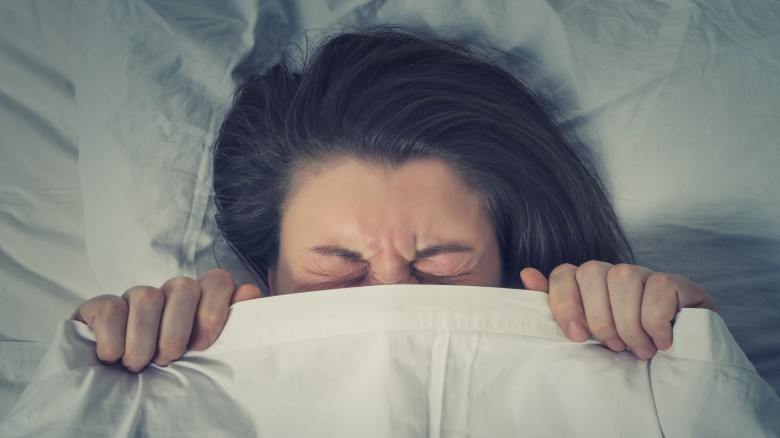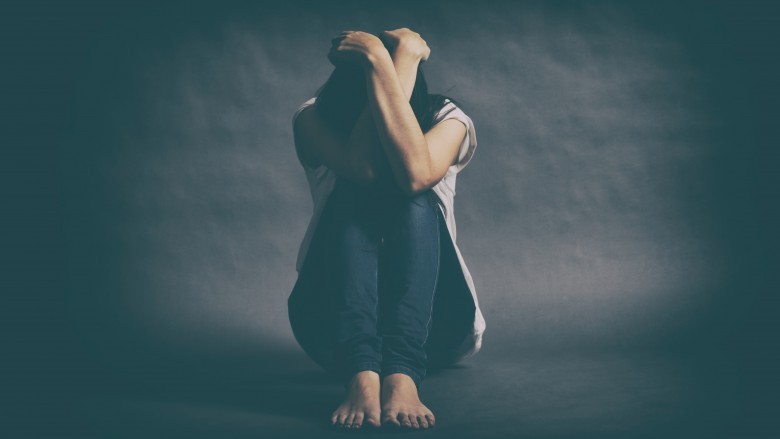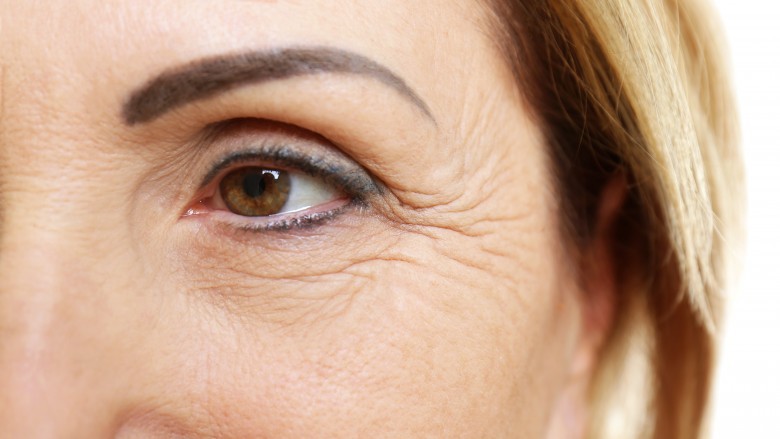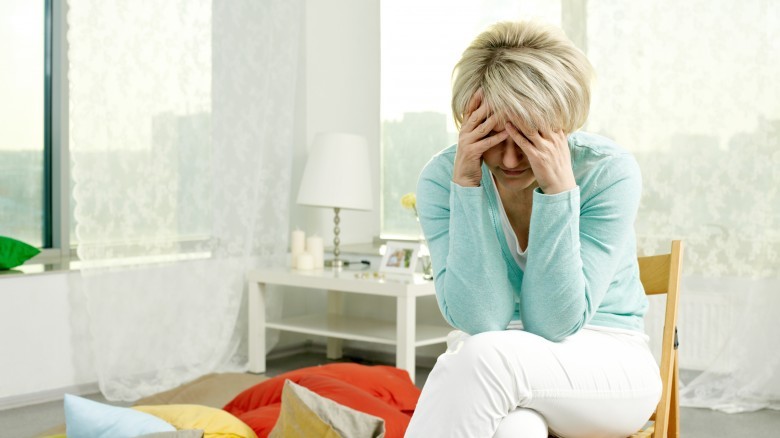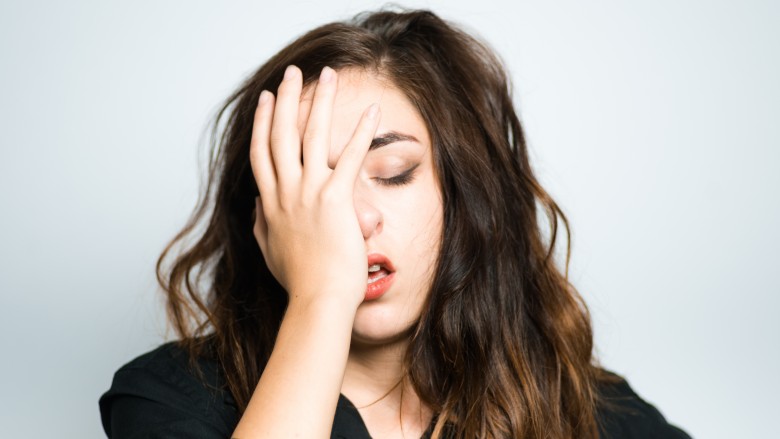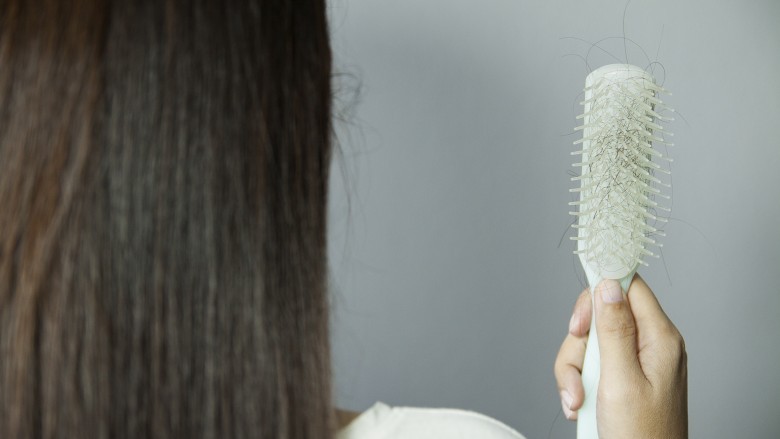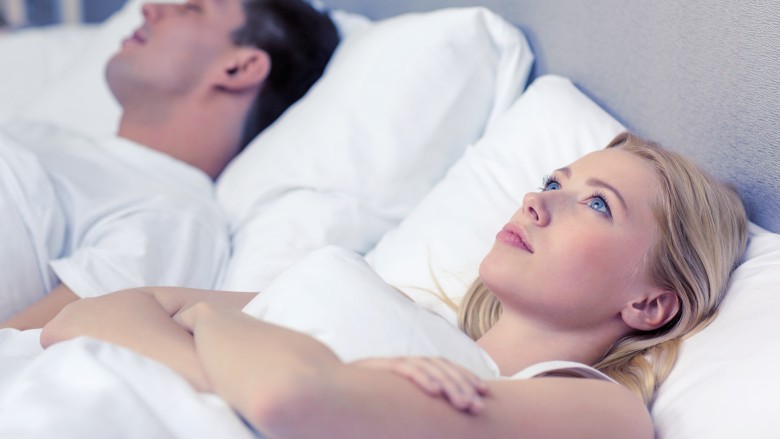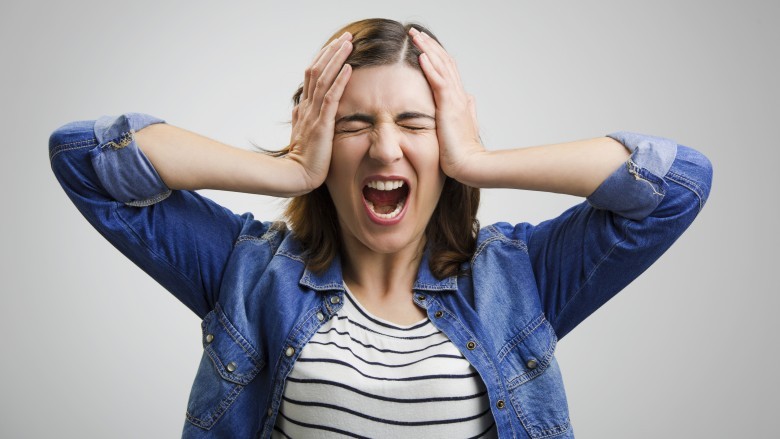Menopause Symptoms No One Has Prepared You For
We may receive a commission on purchases made from links.
The commercials for menopause medications and hormone replacement are pretty terrifying. (Ok, so, I'll be experiencing hot flashes and night sweats...maybe some weight gain too, just for fun?) It sounds like our lives as we know them are going to end, and we'll never be the same. "Beyond hot flashes, women may experience night sweats, weight gain, skin and hair changes, mood changes, pain in their joints, decreased vaginal lubrication and elasticity leading to painful intercourse and more vaginal infections, and decreases in sexual desire," Advanced Practice pharmacist Sally Rafie told me.
Fortunately for all of us, the experts I spoke with shared tips and inspiration for how to navigate the big change, as well as some other symptoms to be aware of. Ladies, let's do this.
Why menopause causes symptoms
One of the reasons why menopause can rock our worlds is because we are simply not taking care of ourselves in the first place. If you are running on little sleep — and lots of caffeine and junk food — it will be much harder to adjust to changing hormones once menopause comes knocking.
"Many women are under considerable pressure juggling a career, a family, and sick or dying parents. Women do most of the work of child rearing and parent‐care compared to their spouses," women's health and nutrition expert Carolyn Dean, MD, ND told me. "The chronic lack of sleep that many women suffer also drains the adrenal glands. By the time of menopause, our adrenal glands may be unable to supply the necessary hormones required to make up for the decline of the ovaries."
You won't feel like yourself
Because menopause is such a tremendous change for each of us, the process itself can be completely overwhelming. Don't be surprised if you notice that you're feeling anxious about everything, once it comes on.
"What I am seeing more and more in my practice are women who are finding it very hard to cope with anything. They are feeling lost and like they are going crazy," registered holistic nutritionist Patricia Eales told me. "They can't think (brain fog) and don't feel that they have any support from loved ones. Many are feeling anxiety and depression." Eales recommended seeking out support to avoid feeling alone.
Dry skin
Menopause is also a time of dryness just about everywhere. Many women start noticing dry hair and skin right away. "Some of the less common symptoms that women get in menopause are dry skin, dry eyes, and hair issues like thinning, dryness, and not growing," Eales told me. "They are also experiencing thinning and brittle nails." Be on the lookout for any new dryness and make sure to keep up with a quality moisturizer.
Vaginal dryness
Speaking of dryness, it's not just your hair and nails that need some extra moisture during menopause. Vaginal dryness is one of the most common and annoying new symptoms you could face.
"Vaginal moisturizers can be used to alleviate some of the vaginal dryness," said Rafie. "In addition, a vaginal lubricant can be used during sex to minimize discomfort and pain. These vaginal moisturizers and lubricants are available over the counter. I recommend products that do not contain harmful ingredients." Talk with your doctor or pharmacist if you could use some guidance finding the right moisturizer for your body.
Lower bone density
One especially important menopause symptom to pay attention to, is lessening bone density. During menopause, our bones can become weaker, putting us at higher risk for serious injuries. "Many women experience a loss in their bone density after menopause," Rafie told me. "This can lead to bone fractures."
Be sure to see your doctor for a bone density test to find out if this is a problem for you. "There are prescription-only medications that can help prevent and treat osteoporosis," said Rafie. "Calcium and vitamin D intake are very important post-menopause."
Changing sex life
Experiencing vaginal dryness can certainly affect your sex life. If intercourse is suddenly painful, it's not going to sound as exciting as it used to. There are also other changes that will affect sex. "Typical menopause symptoms include decreased sex drive and libido, painful sex, and vaginal atrophy where the lining of the vagina gets thinner, drier, and inflamed," Founder and CEO of My Secret Soiree and My Secret Luxury, Stacy Rybchin, told me. "Less common menopause symptoms include unusual vaginal discharge, genital itching, burning or urgency with peeing, more infections, urinary incontinence, and light bleeding after vaginal intercourse." Well I don't know about you, but I am crossing my legs just a little tighter after reading that. Fortunately, there are some solutions out there.
Rybchin recommended always using a high quality lubricant for sex and a vaginal moisturizer all of the time. Her other tip? "Have more sex! Getting aroused brings blood flow and oxygen down to the vagina, keeping the tissues supple and healthy," Rybchin told me. "You do not have to have intercourse. Kissing, masturbation, oral sex, or anything else that turns you on will have similar effects."
Crazy PMS
If you don't exactly look forward to your monthly PMS, then brace yourself for what's to come. Your normal symptoms can start to ramp up during menopause.
"A woman might experience slight changes to premenstrual symptoms, cramping or heavier bleeding during menstruation, headaches, mood swings, or depression when entering into menopause," Dr. Ronald D. Blatt, founder of PrivateRX Intimate Skincare for Menopausal women, and chief surgeon and medical director of the Manhattan Center for Vaginal Surgery and the Manhattan Centers for Women's Health, told me. "Your periods may become irregular." If your symptoms start to feel out of control, check-in with your doctor.
Anxiety
Our hormones have incredible influence over our moods. Think about how different you can feel during pregnancy or even PMS. So when our hormones are going through major changes during menopause, it makes sense that our moods could change.
"Most symptoms of menopause are caused by the hormone imbalances which occur in our changing bodies," author of The Magic of Menopause: A Holistic Guide to Get Your Happy Back! and certified integrative holistic health coach Lorraine Miano told me. "Specifically when it comes to anxiety, panic attacks, allergies, and adrenal fatigue, I like to recommend a holistic approach first for my clients." When it comes to treating the new-onset anxiety, Miano recommended "taking several supplements such as a Vitamin B Complex, Fish Oil, Magnesium, and L-Theanine."
Miano takes a kind approach with her clients and recommends being gentle with yourself. "Boosting your nutrition with a healthy dose of greens also helps," said Miano. "I also recommend gratitude journaling, exercise, getting more sleep, and eliminating all processed foods. All of these things help to keep hormones more balanced while decreasing the stress levels that may perpetuate the anxiety and panic attacks."
Muscle cramps
During both of my pregnancies, I would wake up in the middle of the night with the most intense muscle cramps. I figured this was a pregnancy symptom, but it looks like I may experience them again someday.
"Muscle cramps often happen at night and wake you up. The cause is hormonal imbalance," positive aging advocate Ana Popovic told me. "The cramps and muscle pain can be alleviated with having more calcium, using heat pads, and massage. In more severe cases, painkillers and hormone balancing therapy are required."
Hair loss
As if vaginal dryness and muscle cramps weren't enough, you could start balding during menopause. "Hormonal changes may also trigger hair loss or hair thinning in different areas of the body. On some areas of the body this may be a welcome change, but not on your head," Popovic told me. "The treatments range from lifestyle changes and focusing on a more balanced diet, to scalp massages, herbal remedies such as ginseng, and medications or laser interventions."
If you've been noticing a lot of hair accumulating around the shower drain every morning, talk with your doctor.
Breast tenderness
Noticing breast tenderness used to mean you were pregnant, but once menopause hits, it may be just another symptom to deal with. "Breast soreness or pain is another symptom that is difficult to ignore," said Popovic. "Ice packs, wearing a more comfortable bra, and changing your sleeping positions can all help if the pain is not too strong."
Daily hot flashes
Hot flashes are one of the most common menopause symptoms most women experience, but did you know they could be almost constant? "Hot flashes vary in duration and frequency. Almost 87 percent of people who experience hot flashes have symptoms every day, and 33 percent experience more than 10 episodes a day," Ida Tin, CEO and co-founder of the female health app Clue, told me. "There is no normal for how often you will experience these symptoms. Hot flashes have been reported to last 6 months to 10 years." Ack!
So how can we deal with these daily hot flashes? "Lifestyle changes like eating a balanced diet, exercising regularly, and quitting smoking make a huge difference," said Tin. "Some simpler solutions include wearing layers, drinking ice water when things heat up, and meditation."
Insomnia
Night sweats aren't the only thing keeping women up during menopause. With so many body changes going on, it's hard to wind down at night. First, try lowering the temperature in your bedroom to make it easier to fall asleep. "Without estrogen, the body overreacts to the slightest change in temperature," Dr. Robert S. Rosenberg, board certified sleep medicine physician, and author of The Doctor's Guide to Sleep Solutions for Stress & Anxiety, told me. If that doesn't help, talk with your doctor about medication options.
"Some antidepressants stop hot flashes," Dr. Rosenberg said. "The sleeping pill Lunesta also helps with hot flashes."
Feeling like a tween again
Remember your middle school years? Awkward braces, unrequited love, and rocking mood swings are not something I miss, but those mood swings could return during menopause. Women's health expert and acupuncturist Kristen N. Burris L.Ac. spoke with me about how surprising these changes can be for women.
"Her moods surprise even her, as they rock her all over the place, from up to down in a matter of minutes," Burris told me. "Irritability rises up from nowhere making her snap at the littlest irritation."
It's not just the mood swings taking you back to your glory days. Teenage acne can return as well. "Adult acne rears it's ugly head bringing back not so fond memories of pimples popping out just in time for prom night," Burris said.
Focus on prevention
When it comes to menopause symptom management, Dr. Amanda Alexander likes to focus on prevention. "The best naturopathic care would involve helping a woman identify and decrease as many stressors as possible during her mid-30's or early 40's," she told me. "Then, we can specifically incorporate certain nutrients that help the adrenal glands function optimally like Vitamin C, Pantothenic acid (vitamin B5), and adaptogenic herbs."
Make sure you are taking care of yourself to be able to notice and then treat the early symptoms of menopause.
What we can do about it
Fortunately, there are plenty of new things we can try to offset some of these symptoms. A new symptom is simply a message from our bodies that it's time to make a change. Talk with your doctor about lifestyle changes you could make leading up to and during menopause.
"Lifestyle changes are one way to try to address some of these symptoms," explained Rafie. "Women may find they need to adjust their caloric intake and/or exercise to maintain their pre-pregnancy weight. Yoga and acupuncture can help alleviate symptoms as well."
And making small diet changes could be the first step to feeling better. "I like to start with the basics of a good diet. Eliminating processed foods and introducing healthy fruits and vegetables can lower your BMI and improve your hormone balance," Dr. Faith Whittier, a menopause expert and co-creator of Intersection M, told me. "Exercise can produce natural endorphins to improve mood along with mind body practices such as yoga or the 4-7-8 breathing technique. Hormonal replacement therapy and herbal remedies such as Black cohosh can alleviate hot flashes and sleep disturbances."
Go the natural route
If the hormone replacement commercials have been scaring you, consider talking with a holistic nutritionist or doctor about other options. "I work first and foremost with supporting the liver, because it is the liver that metabolizes and excretes excess hormones from the body," Eales told me. "I then will often recommend vitex (chastetree berry), black cohosh, and ashwagandha. These herbs are very beneficial for balancing hormones and easing menopause symptoms."
Getting enough exercise and trying acupuncture could also be helpful. "Acupuncture and individualized herbal medicine recommendations can make this transition smooth and actually quite peaceful, allowing women more energy for inner reflection and confidence," Burris told me. Before starting any kind of herb or natural treatment, always talk with your doctor or natural medicine practitioner.
Try magnesium
When dealing with menopause symptoms, make sure you are nailing the basics like sleeping and eating well. Then look down the supplement aisle for other treatments.
"Try to get enough rest, eat a good diet, and detoxify. Magnesium is a natural detoxifier that will help prevent bone loss and osteoporosis, as well as some of the other symptoms like mood swings and depression," Dr. Dean told me. "Not all forms of magnesium are easily absorbed by the body. Magnesium citrate powder is easily absorbed and can be mixed with water and sipped throughout the day."
You can embrace it
Even though the symptoms sound scary, menopause does not have to be something to be dreaded. In the final chapter of Miano's book, Let The Party Begin!, she shared that menopause does not have to be something to be feared. "Women are conditioned to believe that menopause is a stage of life that is to be feared and even avoided if possible," wrote Miano. "They are often left confused and apprehensive when presented with misinformation or certain 'myths' about 'the change'."
Don't feel that you have to go through this transition alone. Seek support from friends and family, while working with your healthcare provider.

